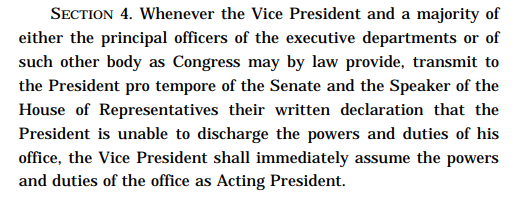Ok. Let& #39;s do a quick succession tweetstorm.
First, if a POTUS dies, under the 25th amendment, sec 1, the Vice-President becomes president.
(Previously, a similar provisions in Article II, Sec 1, clause 6 controlled, but it was ambiguous. The 25th amendment clarifies it)
First, if a POTUS dies, under the 25th amendment, sec 1, the Vice-President becomes president.
(Previously, a similar provisions in Article II, Sec 1, clause 6 controlled, but it was ambiguous. The 25th amendment clarifies it)
The 25th amendment also provides that if there is a vacancy in the Vice-presidency, POTUS shall nominate a new VP, who must be confirmed by a majority in both the House and Senate. Prior to ratification in 1967, if POTUS left office, the VP remained vacant until next election.
What if both POTUS and VPOTUS die or leave office? Article II, Sec 1, provides that Congress may, by law, create a succession order.
The law was overhauled most recently in 1947 (3 USC 19). The first 3 offices are House Speaker, Senate Pro Tem, and Secretary of State.
The law was overhauled most recently in 1947 (3 USC 19). The first 3 offices are House Speaker, Senate Pro Tem, and Secretary of State.
The 25th amendment also provides for situations in which the president needs to voluntary give up his power temporarily (think GWB having general anesthesia for his polyp removal). POTUS may temporarily transfer power to VPOUTS in such cases, making VPOUTS Acting President.
The 25th amendment also provides for if the president is incapacitated but not dead, and cannot relinquish the power by his own will. The VP, with the backing of the majority of the cabinet, may assume the powers of the presidency upon written notification of Congress.
This is the so-called "25th amendment option" you hear about from people who want Trump removed. It was never intended to be used like that, and the details of the 25th amendment make it a mess. @ProfBrianKalt is your expert, this is the thread you want. https://twitter.com/ProfBrianKalt/status/1176522894999834624?s=20">https://twitter.com/ProfBrian...
Ok. That& #39;s the basics. But what happens if all this goes down in the middle of an election season? How does it affect the candidates/voting/electors/succession?
It mostly depends on *when* things happen. Let& #39;s work backwards.
It mostly depends on *when* things happen. Let& #39;s work backwards.
First situation is when you have a president-elect and vice-president-elect.
Most experts agree you have that after the electors vote (first Mon after second Wed of Dec under 3 USC 5; 12/14 this year). Some have argued it& #39;s not till Congress counts on 1/6 (3 USC 15).
Most experts agree you have that after the electors vote (first Mon after second Wed of Dec under 3 USC 5; 12/14 this year). Some have argued it& #39;s not till Congress counts on 1/6 (3 USC 15).
In this case, the 20th amendment says that if the president has died, the vice-president will become president.
There& #39;s no provision for what happens if the VP-elect dies, but the 25th amendment would allow the new POTUS to nominate someone, confirmable by majorities of both chambers of Congress.
If the winner of the election dies *before* the electors vote (and, arguably, before Congress counts the votes), the 20th amendment is not operable. You do not have a president-elect and vice-president-elect.
Prior to the election, it& #39;s relatively straightforward. Both parties have rules providing for the replacement of candidates by the party national committee. Ballot access could be tricky in many states, but since you are really voting for electors, it& #39;s not *that* big of a deal.
After the election, it& #39;s a bit trickier. The parties rules still call for replacement candidates to be named by the national committees, who would likely name the VP candidate, and electors would likely follow.
But electors are both plausibly free agents *and* plausibly bound by state law. That is, they might feel free to vote for whoever they want *or* they might be compelled by state law to still vote for the deceased candidate.
We have one historical example: Horace Greeley died on November 29, 1872, having gotten 66 electoral votes. 63 of the electors voted for other names, mostly Thomas Hendricks (*not* Greeley& #39;s running mate). It didn& #39;t really matter; Grant had won the election in a landslide.
Ok. That& #39;s the basics. Now the commentary.
The Succession Act, as currently written, is bad. At a political level, it just makes for a lot of problems if people of opposite parties are in line. https://twitter.com/mattyglesias/status/1312000097375465480?s=20">https://twitter.com/mattygles...
The Succession Act, as currently written, is bad. At a political level, it just makes for a lot of problems if people of opposite parties are in line. https://twitter.com/mattyglesias/status/1312000097375465480?s=20">https://twitter.com/mattygles...
These bad incentives could have wrecked havoc on Watergate had the 25th amendment not helped out. https://twitter.com/MattGlassman312/status/1258847785069080576?s=20">https://twitter.com/MattGlass...
Even worse, it& #39;s not clear if the Succession Act is constitutional. The list can only include "officers" and there& #39;s a debate about whether legislative branch actors even qualify.
Maybe they do, maybe they don& #39;t. It& #39;s bad news that people could disagree in good faith.
Maybe they do, maybe they don& #39;t. It& #39;s bad news that people could disagree in good faith.
Some additional thoughts from @joshchafetz on what electors might be able to do or not do based on state law in a death situation between the election and the electoral college vote. https://twitter.com/joshchafetz/status/1312020719266660352?s=20">https://twitter.com/joshchafe...
And here& #39;s election law expert @rickhasen on the varieties of messes than can occur if a POTUS candidate dies before the election and parties, voters, and ballot access laws are scrambling things. https://twitter.com/rickhasen/status/1311902346306232321?s=20">https://twitter.com/rickhasen...
Excellent thread with lots of good information about succession by continuity of government expert @johncfortier1 of @BPC_Bipartisan. https://twitter.com/ThorningMichael/status/1312027312544776193?s=20">https://twitter.com/ThorningM...

 Read on Twitter
Read on Twitter








